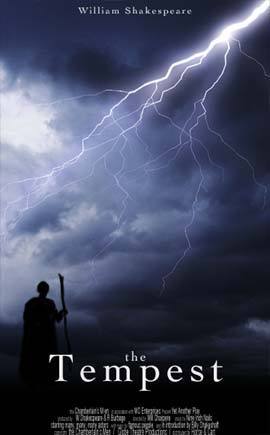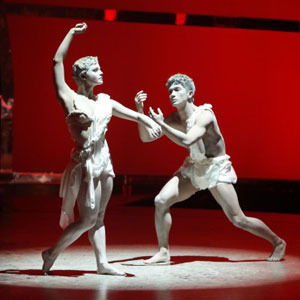The Tempest: Characters
On Tuesday & Wednesday, Sept. 13 & 14, from 6-9 p.m. in the Mini-Theatre at Hudson High School, for all interested students, we will be holding auditions for Shakespeare's The Tempest, which will perform the weekend before Thanksgiving.
 For Auditions:
For Auditions:If you wish to, you can come prepared with a monologue (no more than 15 lines, please!) from The TempestThe majority of the audition will be cold readings of scenes from The Tempest (so it's not a bad idea to read or see the play before showing up to auditions)It is entirely possible that I will not have room for everyone in the cast, since I want to keep the cast to between 14-20 people. So put your best foot forward...and remember that there are lots of upcoming plays this year!
Basic Concept of the Play:
In my research on The Tempest, a few thoughts struck me:
1) Essentially, the play is made up of four plots that begin but don't really go anywhere
2) This is generally acknowledged to be Shakespeare's last play, and Prospero to be a slight reflection of the playwright himself (especially Prospero's final speech)
3) Peter Brooke, the revolutionary director and author of The Empty Space, said that Tempest was the Shakespeare play he returned to time and again because it really was an expression not so much of a particular plot as the interior being of those creating the world of the play
4) Although the Colonial overtones are obvious (esp. re: Ariel and Caliban), there's something to the Freudian interpretation - best represented in the movie sci-fi adaptation, Forbidden Planet - that Caliban is Prospero's id and Ariel his superego.
 For me, then, mixing in the element of a King Lear-esque Shakespeare writing his own ending through Prospero, Caliban turns into all those doubts, those fruitless ambitions, those petty jealousies, those frustrated hopes - while Ariel remains the unattainable and only nominally governable muse.
For me, then, mixing in the element of a King Lear-esque Shakespeare writing his own ending through Prospero, Caliban turns into all those doubts, those fruitless ambitions, those petty jealousies, those frustrated hopes - while Ariel remains the unattainable and only nominally governable muse. The titular tempest becomes Prospero's frustrated and final attempted to write something of worth, to expend all the words within him. Miranda becomes his secretary, his protege, his literary daughter, a fleshy incarnation of his muse - the next generation of wordsmiths - who looks always forward without understanding the shoulders of the giant on whom she so firmly stands.
Each of the four plotlines, therefore, are being "written" as they happen: 1) Miranda's romance with Ferdinand; 2) Caliban inciting the fools, Trinculo and Stephano to rape Miranda and usurp Prospero; 3) Antonio and Sebastian conspiring to kill the King of Naples and his resident philosopher, also to ultimately rule this desert isle; 4) and Prospero's attempt to master and reconcile with all involved - in particular with Ariel, Caliban and Miranda.
And sometimes, the character write their own destinies (e.g., Miranda writes Ferdinand for herself).
Quelle surprise, I'll be including music and dance in the play as well (because it's in the play...and, c'mon, I'm directing). I'm not sure of everything I'm using, but I'm definitely using "Falling" by The Civil Wars, probably in place of the random Isis masque at the pseudo-marriage of Miranda and Ferdinand.
Character DescriptionsProspero (male) is our main character, and it may be said that nearly everything that happens on the stage is a creation from his mind; that we are watching an aging wordsmith create his last work. He is by turns crazed, gentle, fatherly, jealous, vengeful, remorseful - and a tempest of other emotions. Through the course of the play, he comes to peace with the end of his life's work and quits the stage. Miranda (female) is Prospero's secretary in "real life," and his daughter in the world of the play. She is a budding writer herself, a little cheeky, and a romantic. She writes herself a romance in Ferdinand, partly as a way of disentangling herself from her father-mentor, Prospero
 Ariel (female) is Prospero's muse, who has been bound to Prospero for the past several decades. By turns puckish, impudent, sorrowful, and sprightly, Ariel longs for freedom from Prospero's control - although not necessarily from Prospero himself.Caliban (male) is Prospero's darker self who drinks, swears, and swears vengeance on Prospero for controlling him. A cruel manifestation, he once attempted to rape Miranda, which Prospero stopped. Caliban, too, longs for freedom and seeks it by taking up with two fools and inciting them to kill Prospero. While there is much that is visceral and vicious about Caliban, he is also a sympathetic creature since Prospero has never dealt with him except by abuse.Alonso (male or female) is the King or Queen of Naples, and the father of Ferdinand, who joined with Antonio to maroon Prospero. Lately, he has been feeling guilty for his part in destroying Prospero, and is therefore on the path to redemption.Sebastian (male or female) is Alonso's brother or sister, who longs to rule Naples in Alonso's place. S/he is incited to do so by Antonio, but thwarted by Ariel.Antonio (male or female) is Prospero's usurping sibling, who proves his continued ambition by inciting Sebastian to overthrow Alonso, and from there to overthrow the island. Although by the end, Prospero forgives Antonio, it's unclear whether Antonio ever feels remorse for what s/he did.Ferdinand (male) is the strong, studly and simple son of Alonso, who is created by Miranda and Prospero to woo and win Miranda. In some ways, he's a representation of Prospero when he was a young author, wide-eyed and fearless.Trinculo (female) is Alonso's "jester," or for our purposes an aging boozy-floozy, the sort you'd find wasting away on a piano in a seedy bar. She is comical, terrified of everything, and completely in love with Stephano. There's something pathetic about her; she is what Miranda might become if she does not disentangle herself from Prospero's commandStephano (male) is Alonso's drunken butler, very broad and jovial, and absurdly commanding. (Think Sir Toby from Twelfth Night, Falstaff from Henry IV, Bottom from A Midsummer Night's Dream, etc.) He is the foolish form of majesty, which in Alonso is a misspent youth, in Sebastian is slavish ambition, in Antonio is destructive envy, and in Prospero is frightful dominion. He views Trinculo's admiration of him and Caliban's service to him as only natural. Although he is incited by Caliban to kill Prospero, rape Miranda and take over the island, he is more concerned with the moment and having a good time to be that much of a threat.Other lords and ladies of the court, members of the ship, spirits on the island, etc. Possibly Caliban's mother in flashback.I'm very much looking forward to what each of you brings to auditions! We're going to have a grand time, I think!
Ariel (female) is Prospero's muse, who has been bound to Prospero for the past several decades. By turns puckish, impudent, sorrowful, and sprightly, Ariel longs for freedom from Prospero's control - although not necessarily from Prospero himself.Caliban (male) is Prospero's darker self who drinks, swears, and swears vengeance on Prospero for controlling him. A cruel manifestation, he once attempted to rape Miranda, which Prospero stopped. Caliban, too, longs for freedom and seeks it by taking up with two fools and inciting them to kill Prospero. While there is much that is visceral and vicious about Caliban, he is also a sympathetic creature since Prospero has never dealt with him except by abuse.Alonso (male or female) is the King or Queen of Naples, and the father of Ferdinand, who joined with Antonio to maroon Prospero. Lately, he has been feeling guilty for his part in destroying Prospero, and is therefore on the path to redemption.Sebastian (male or female) is Alonso's brother or sister, who longs to rule Naples in Alonso's place. S/he is incited to do so by Antonio, but thwarted by Ariel.Antonio (male or female) is Prospero's usurping sibling, who proves his continued ambition by inciting Sebastian to overthrow Alonso, and from there to overthrow the island. Although by the end, Prospero forgives Antonio, it's unclear whether Antonio ever feels remorse for what s/he did.Ferdinand (male) is the strong, studly and simple son of Alonso, who is created by Miranda and Prospero to woo and win Miranda. In some ways, he's a representation of Prospero when he was a young author, wide-eyed and fearless.Trinculo (female) is Alonso's "jester," or for our purposes an aging boozy-floozy, the sort you'd find wasting away on a piano in a seedy bar. She is comical, terrified of everything, and completely in love with Stephano. There's something pathetic about her; she is what Miranda might become if she does not disentangle herself from Prospero's commandStephano (male) is Alonso's drunken butler, very broad and jovial, and absurdly commanding. (Think Sir Toby from Twelfth Night, Falstaff from Henry IV, Bottom from A Midsummer Night's Dream, etc.) He is the foolish form of majesty, which in Alonso is a misspent youth, in Sebastian is slavish ambition, in Antonio is destructive envy, and in Prospero is frightful dominion. He views Trinculo's admiration of him and Caliban's service to him as only natural. Although he is incited by Caliban to kill Prospero, rape Miranda and take over the island, he is more concerned with the moment and having a good time to be that much of a threat.Other lords and ladies of the court, members of the ship, spirits on the island, etc. Possibly Caliban's mother in flashback.I'm very much looking forward to what each of you brings to auditions! We're going to have a grand time, I think!
Published on September 03, 2011 16:23
No comments have been added yet.



